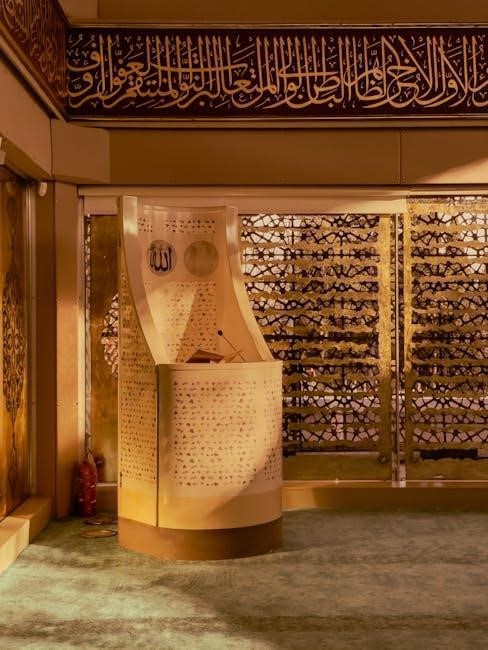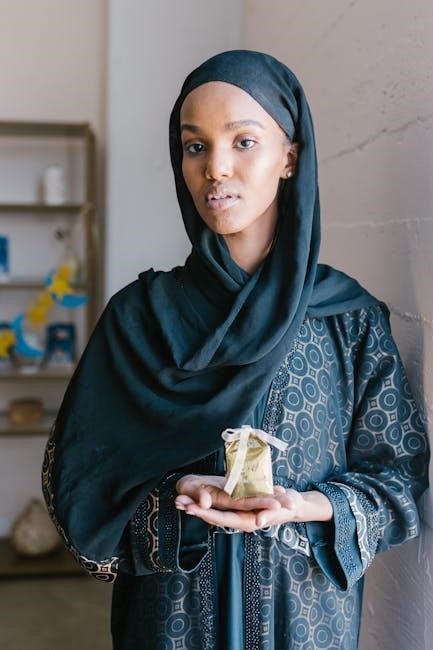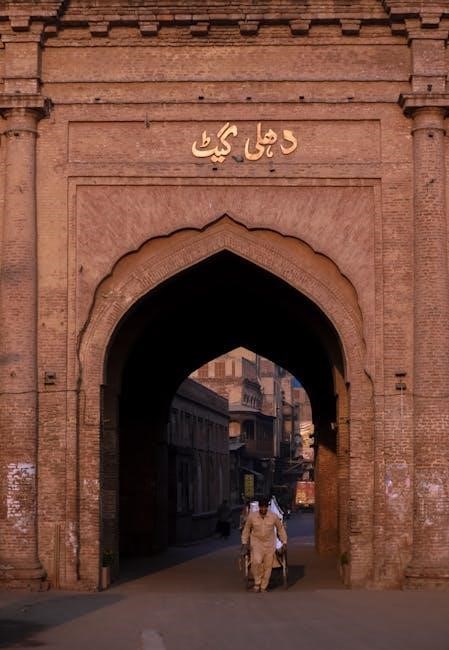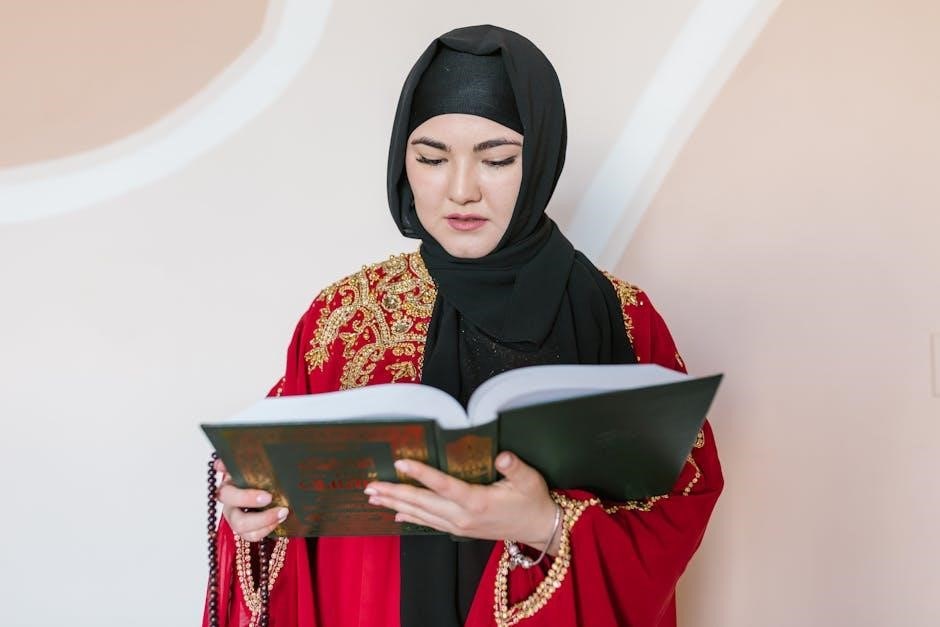
The Arabic language is a vital tool for understanding Islamic texts, including the Quran and Hadith. In Pakistan, learning Arabic is essential for religious and cultural connection, offering deep insights into Islamic scholarship and fostering spiritual growth. This guide provides a comprehensive path to mastering Arabic, tailored to learners in Pakistan, blending traditional methods with modern resources to enhance language acquisition and appreciation.
Why Study Arabic?
Studying Arabic unlocks access to the Quran, Islamic teachings, and a rich cultural heritage. In Pakistan, Arabic is vital for understanding religious texts and connecting with Islamic traditions. It enhances spiritual growth, facilitates deeper Quranic comprehension, and bridges cultural gaps. Arabic also opens doors to scholarly resources and fosters a stronger bond with the global Muslim community, making it a valuable skill for both religious and intellectual enrichment.
Importance of Arabic in Islamic Scholarship
Arabic is the liturgical language of Islam, holding paramount importance in understanding the Quran, Hadith, and classical Islamic texts. Mastery of Arabic enables scholars to engage deeply with original sources, ensuring accuracy in theological understanding. It is essential for interpreting Islamic jurisprudence, theology, and spirituality, making it a cornerstone of Islamic scholarship. In Pakistan, Arabic proficiency is highly valued for accessing religious knowledge and connecting with the Islamic intellectual heritage.
Course Outline and Curriculum
A comprehensive 12-18 month program structured in three parts, focusing on Quran understanding and Salah. It builds skills from basic comprehension to advanced grammar, including Nahw and morphology, using AI tools for enhanced learning.
Duration and Structure
The Pakistani Arabic guide outlines a structured curriculum spanning 12 to 18 months, divided into three progressive parts. Each phase builds on the previous, starting with foundational Arabic comprehension and gradually advancing to complex grammar and morphology. Designed for consistency, the course integrates AI tools to enhance learning efficiency, ensuring learners achieve fluency and depth in understanding both classical and modern Arabic, particularly for Quranic studies and practical communication.
Key Objectives and Skills Development
The primary objective is to enable learners to comprehend and engage with Arabic, focusing on understanding the Quran and Islamic texts. Skills developed include reading, writing, and speaking, with emphasis on grammar, morphology, and vocabulary. The course integrates Islamic studies with cultural insights, ensuring learners grasp both linguistic and religious contexts effectively, supported by modern tools for enhanced understanding and practical application of Arabic in daily and spiritual life.
Arabic Dialects and Variations
Arabic encompasses diverse dialects, with Modern Standard Arabic (MSA) being the formal, unifying variant, while regional dialects in Pakistan reflect local influences and cultural nuances, blending tradition with modern usage.
Classical Arabic vs. Modern Standard Arabic
Classical Arabic is the liturgical language of Islam, used in the Quran and Hadith, known for its complex grammar and rich vocabulary. Modern Standard Arabic (MSA) is the contemporary form, simplified for formal writing, media, and education. While Classical Arabic is revered for its historical and religious significance, MSA bridges the gap between dialects, enabling clear communication across the Arab world. Both forms coexist, serving different purposes in literature, worship, and everyday life.
Regional Dialects in Pakistan
In Pakistan, Arabic dialects are influenced by regional languages and cultural interactions. While Modern Standard Arabic is widely taught, local dialects vary, reflecting Pakistan’s diverse linguistic landscape. Urban dialects often blend with Urdu, while rural dialects may incorporate indigenous languages. These variations highlight the dynamic nature of Arabic in Pakistan, making it essential for learners to understand both standard and regional forms for effective communication and cultural engagement.

Cultural Insights and Context
Understanding Arabic in Pakistan requires respecting cultural nuances and traditions. The language is deeply intertwined with Islamic values and local customs, enriching communication and fostering mutual respect.
Understanding Arabic Culture
Arabic culture is rich in history, hospitality, and traditions. It emphasizes respect, family values, and community bonds. In Pakistan, learning Arabic connects learners to these cultural norms, fostering cross-cultural understanding.
The language mirrors the society’s deep-rooted traditions, making it essential to grasp cultural nuances for effective communication. This blend of tradition and modernity enriches the learning experience.
Religious and Social Significance
Arabic holds profound religious significance in Pakistan, as it is the language of the Quran and Islamic prayers. Mastery of Arabic enables deeper engagement with religious texts and rituals. Socially, it fosters respect and connectivity within Muslim communities, bridging cultural and linguistic gaps. Understanding Arabic enhances spiritual practice and strengthens cultural identity, making it a cornerstone of Islamic heritage and daily life in Pakistan.
Resources for Learning Arabic
Essential resources include Arabic phrasebooks, dictionaries, and online tools. PDF guides and structured textbooks offer comprehensive learning. AI-powered apps enhance language acquisition, providing practical skills and cultural insights efficiently.
Recommended Phrasebooks and Dictionaries
For effective learning, utilize Arabic phrasebooks and dictionaries available in PDF format. These resources provide essential vocabulary for daily use and travel. The Hans-Wehr Dictionary App is highly recommended for detailed word meanings. Comprehensive textbooks, such as “Teach Yourself Essential Arabic Vocabulary,” offer structured learning with thematic units, grammar tools, and cultural insights. These resources are ideal for both self-learners and formal students, ensuring a strong foundation in Arabic.
Online Tools and Apps
Enhance your Arabic learning journey with online tools and apps. Platforms like Qalam utilize AI for writing and text processing in Arabic. Apps such as Hans-Wehr Dictionary offer detailed word breakdowns and contextual meanings. Many websites provide free PDF phrasebooks and structured courses. These resources cater to both beginners and advanced learners, ensuring efficient and engaging language acquisition. They often include interactive lessons, pronunciation guides, and cultural insights to enrich your learning experience.

Education and Institutions
Universities in Pakistan offer comprehensive Arabic programs, while language schools provide structured courses. Institutions like Oxford University Press support learning with textbooks and resources, enriching Arabic education.
Universities Offering Arabic Programs
Several universities in Pakistan offer Arabic programs, such as the University of Karachi and the University of the Punjab. These institutions provide undergraduate and graduate programs, focusing on Arabic language, literature, and Islamic studies. They often emphasize the cultural and religious significance of Arabic, offering courses tailored to both native and non-native speakers. These programs are designed to equip students with advanced language skills and a deep understanding of Arabic texts, including the Quran and classical literature.
Language Schools and Tutors
In Pakistan, private language schools and tutors provide specialized Arabic instruction, catering to diverse learning needs. Many offer courses tailored for beginners, focusing on conversational skills and Quranic understanding. Tutors often emphasize personalized attention, enabling learners to grasp complex grammar and vocabulary effectively. These programs are particularly popular among students seeking to deepen their religious knowledge or prepare for advanced Islamic studies, ensuring a strong foundation in Arabic language proficiency.

Common Arabic Phrases and Vocabulary
Essential Arabic phrases and vocabulary are crucial for effective communication. Key expressions include greetings, common verbs, and religious terms. Dialects in Pakistan often blend local influences, making contextual learning vital for practical use and deeper cultural understanding. This guide simplifies mastering these phrases, aiding both everyday interactions and Quranic studies.
Essential Words for Everyday Use
Mastering essential Arabic words is vital for daily communication. Common phrases include greetings like Assalam o Alaikum (Peace be upon you) and Marhaban (Welcome). Key verbs such as akala (to eat) and shariba (to drink) are fundamental. Expressions like Shukran (Thank you) and Afwan (You’re welcome) are widely used. Learning numbers, days, and basic questions enhances interaction. Blending local dialects with standard Arabic, this guide provides practical vocabulary tailored to everyday situations in Pakistan, ensuring effective communication and cultural understanding.
Religious Expressions and Prayers
Understanding key religious expressions is central to Arabic learning in Pakistan. Common phrases include Assalam o Alaikum (Peace be upon you) and Insha’Allah (God willing). Prayers like Subhanallah (Glory to God) and Alhamdulillah (Praise be to God) are integral to daily life. This guide highlights essential religious vocabulary and prayers, enabling learners to connect with Islamic traditions and engage in spiritual practices confidently, fostering a deeper understanding of faith and culture.
The Quran and Arabic
The Quran is revealed in Arabic, making it essential to learn the language for true understanding. This guide helps Pakistanis master Quranic Arabic, bridging cultural and religious connections through dedicated resources and structured learning approaches.
Understanding the Quran in Arabic
Mastering Arabic is crucial for comprehending the Quran’s deeper meanings. Classical Arabic, used in the Quran, differs from Modern Standard Arabic, requiring dedicated study. Resources like phrasebooks and dictionaries, available in Pakistan, aid learners in grasping Quranic vocabulary and grammar. Structured courses and expert tutors further enhance understanding, enabling believers to connect deeply with the Quran’s teachings and spiritual significance in their daily lives and worship.
Recitation and Language Skills
Mastering Arabic recitation enhances Quranic understanding and spiritual connection. Proper tajweed (elocution) is essential for accurate recitation; Language skills, including grammar and vocabulary, deepen comprehension of Quranic verses. Resources in Pakistan, such as specialized courses and tutors, focus on improving recitation techniques and melodic delivery, fostering a stronger bond with the Quran and its teachings through precise and beautiful articulation of the Arabic language.

Arabic in Pakistan
Arabic holds significant cultural and religious importance in Pakistan, with many seeking to learn it for Quranic studies and Islamic scholarship. Local institutions and resources support Arabic education, blending traditional methods with modern tools to promote language proficiency and spiritual enrichment among learners.
Historical Context
Arabic’s presence in Pakistan traces back to the Islamic conquests and the spread of Sufism, making it a cornerstone of religious and cultural heritage. The language flourished through scholars and madrasas, preserving Islamic texts like the Quran and Hadith. Historical ties with Arab traders and travelers further enriched its influence, blending with local languages to create a unique cultural mosaic that endures in Pakistan’s spiritual and academic traditions.
Modern Usage and Relevance
In Pakistan, Arabic remains vital for religious and academic pursuits, with universities offering specialized programs. It bridges cultural ties with Arab nations, enhancing diplomacy and trade. Arabic’s role in understanding Islamic texts like the Quran and Hadith is unparalleled, making it a cornerstone of religious education. Its modern relevance extends to media, literature, and digital platforms, ensuring its continued importance in Pakistan’s intellectual and spiritual landscape.
Advanced Learning Techniques
Advanced techniques include mastering Arabic grammar and morphology, utilizing AI tools for language processing, and leveraging interactive apps for immersive learning experiences.
Grammar and Morphology
Mastering Arabic grammar and morphology is crucial for understanding the language’s structure. Resources like the Hans-Wehr dictionary and AI tools such as Qalam aid in analyzing word roots and patterns. Morphology helps learners construct and deconstruct words, while grammar provides the rules for sentence formation. These skills are essential for advanced learners in Pakistan, enabling deeper comprehension of Quranic texts and improving communication effectiveness.
Using AI Tools for Language Learning
AI tools like Qalam and Arabic language apps offer innovative ways to learn Arabic in Pakistan. These tools provide real-time feedback, pronunciation guides, and interactive exercises. They also help learners understand complex grammar and morphology through visual aids and practice drills. AI-powered platforms adapt to individual learning paces, offering personalized paths for mastery. Such tools are invaluable for modern learners, enhancing efficiency and engagement in Arabic language acquisition.
Mastering Arabic in Pakistan requires dedication and consistent practice. By leveraging resources like phrasebooks and AI tools, learners can achieve fluency, unlocking cultural and religious understanding while enriching their spiritual journey.
Final Tips for Mastery
To master Arabic, practice consistently and immerse yourself in the language. Use AI tools like Qalam for writing and Hans-Wehr for dictionary needs. Set clear goals, whether for religious study or everyday communication. Engage with native speakers and join language communities. Regularly review grammar and vocabulary, using structured resources like “Teach Yourself Essential Arabic Vocabulary.” Stay motivated, and embrace both traditional and modern learning methods for holistic proficiency.
Continuous Learning and Practice
Continuous learning and practice are crucial for mastering Arabic. Regularly review grammar, vocabulary, and morphology, using structured resources like “Teach Yourself Essential Arabic Vocabulary.” Engage with AI tools such as Qalam for writing and Hans-Wehr for dictionary needs. Immerse yourself in the language through consistent practice, whether reading, writing, or speaking. Regularly interact with native speakers and join language communities to refine your skills and stay motivated.